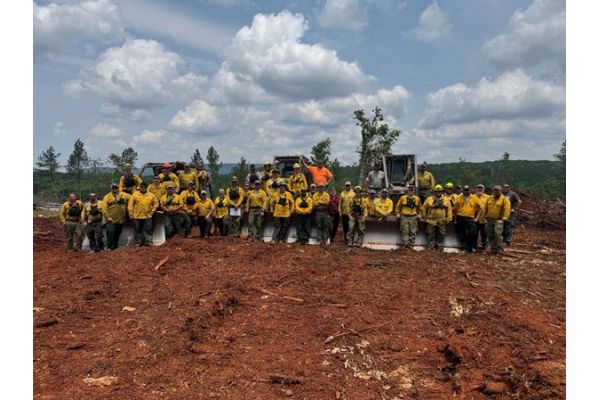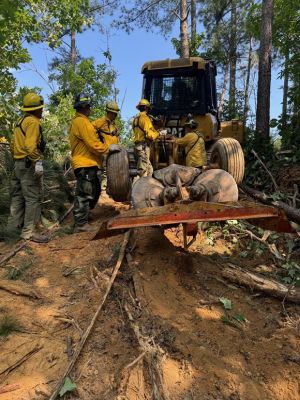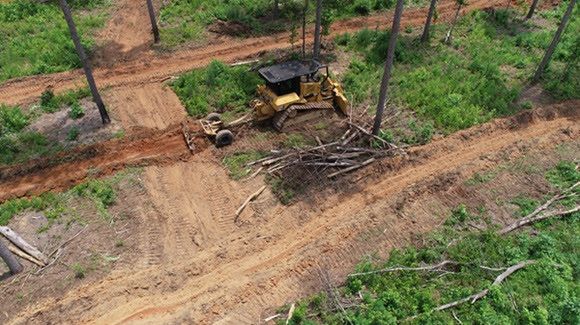Wildland Firefighting Operator Academy Ignites Conservation in North Carolina

EDGEFIELD, S.C. — The North Carolina NWTF State Chapter recently sponsored a unique wildland firefighting operator academy hosted by the North Carolina Wildlife Resources Commission. As wildfires become more common throughout North Carolina — especially in western North Carolina, where forests are now littered with fire-prone dead trees in the aftermath of Hurricane Helene — certified wildland firefighters are vital to conserving the Tar Heel State’s natural treasures.
“We are proud to partner with the North Carolina Wildlife Resources Commission on projects, some that benefit wild turkeys directly and others that benefit our beloved bird indirectly,” said Roger Reynolds, North Carolina NWTF State Board member. “We have a long history of partnering with the commission within the Yadkin River Game Lands, so we were happy to continue that partnership in a unique way with the wildland firefighter operator academy.”
The NCWRC previously leased these lands from a corporate entity to provide hunting access. When the properties were set to be sold, partners stepped in to keep them open to the public. The North Carolina NWTF State Chapter collaborated with the Three Rivers Land Trust to help purchase and conserve these treasured game lands. In 2018, NWTF North Carolina volunteers allocated $100,000 toward the purchase of over 2,400 acres.
After the purchase, the NWTF continued its partnership with the NCWRC on the Yadkin River Game Lands, allocating $36,000 to support hunter access projects, including the development of a parking area and the creation of 3 miles of roads within the game lands.
Now owned by the NCWRC in perpetuity, the lands are helping the agency reach its goals for both wildlife and technical training. The recent wildland firefighter operator academy was an example of both.
“We are regularly called in by the North Carolina Forest Service and the [USDA] Forest Service as well,” said Cody Fulk, NCWRC Troy team leader. “When there are large-scale wildfires in North Carolina, we go assist them.”
Fulk and his team’s primary objective is managing public lands for the health of North Carolina’s wildlife. And while they are proficient with prescribed burning as a management tool, there are significant differences between extinguishing wildfires and using prescribed burning.
“Because we are not primarily wildland firefighters, there’s not a lot of training devoted to fire-specific operations,” he said. “We do a lot with prescribed fire, but there are differences between prescribed fire and wildfire, and it was important to me and my supervisors that folks get that training, so we started designing this academy.”
Fulk worked with the USDA Forest Service to create a federally accredited academy that ensures the courses meet stringent requirements and are designed with “real-life firefighting scenarios.”
The NWTF provided funding for the meals of 50 wildland firefighting trainees for a week, allowing them to focus on their assignments and simulate real-life scenarios.
“I wanted to treat this as an actual deployment, as if they were fighting a wildfire somewhere,” Fulk said. “Meals are really the one thing you don’t have to worry about on a wildfire. Now granted, you never know when they’re going to show up, and it might just be a wet sandwich. I wanted this meal to be something they don’t have to think about, just as if they were fighting a real fire. It shows up. It’s mealtime, and then we go back to work. But, for the training, I wouldn’t want it to be a wet sandwich but something good.”
Reynolds added, “Our state chapter board saw this academy as an opportunity to further the education of our land managers and their ability to conserve North Carolina’s wildlife. We were happy to help sponsor the event.”
The course consisted of one day of classroom time and bookwork, after which the trainees spent the rest of the week in the field, working as if on a real fire scenario, assigned to a strike team and facing various challenges.
“We essentially built a BMX course for bulldozers,” Fulk said. “We built all of these obstacles and tasks that they had to complete on a dozen different pieces of equipment. It was all centered around fire and how to contain it in various scenarios.”
Also included in the course was a segment on how to manage fire lines for wildlife.
“This might sound selfish, but for me and the game lands that I manage, having a dozen bulldozers on site meant I was going to get a lot of extra work done,” Fulk said. “I got 8 miles of fire lines put in and flagged off of the access road that the NWTF helped fund. We will be able to manage these areas for wildlife with prescribed fire into the future. Because of the NWTF, in two years, I got 15 years’ worth of work done.”
From the North Carolina NWTF State Chapter’s $100,000 contribution to helping with the meals of wildland firefighters, the chapter’s efforts continue to yield benefits on North Carolina’s public lands, supporting both wildlife and the people who conserve it.
About the National Wild Turkey Federation
Since 1973, the National Wild Turkey Federation has invested over half a billion dollars into wildlife conservation and has positively impacted over 24 million acres of critical wildlife habitat. The NWTF has also invested over $10 million into wild turkey research to guide the management of the wild turkey population and to ensure sustainable populations into perpetuity. The organization continues to deliver its mission by working across boundaries on a landscape scale through its Four Shared Values: clean and abundant water, healthy forests and wildlife habitat, resilient communities, and robust recreational opportunities. With the help of its dedicated members, partners and staff, the NWTF continues its work to provide Healthy Habitats. and Healthy Harvests. for future generations.


